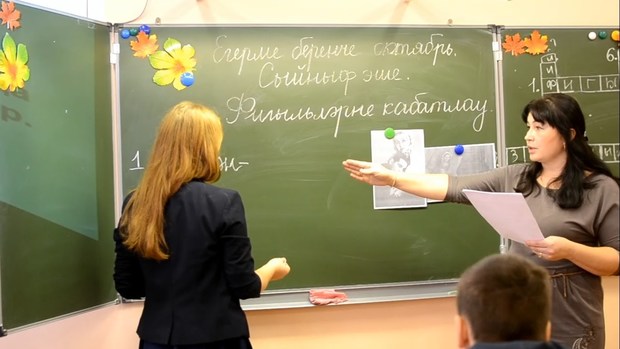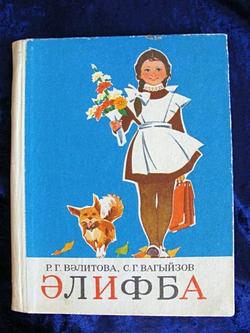Elmir Nizamov: ''It is impossible to learn a language without love''
Composer about learning the Tatar language at schools
The discussion whether we should learn the Tatar language and how to learn it affected many people. Young and successful Tatarstan composer whose compositions become more and more famous outside the country Elmir Nizamov decided to express his opinion today. In his column, he shares his own experience of learning languages. We offer his thoughts to Realnoe Vremya's readers.
''I spoke Russian bad, and they decided I was underdeveloped''
I just could not help but tell what I thought about this topic. The question of conservation and support of the Tatar language in Tatarstan has always been topical. But this topic has weighed heavily in Kazan in the last months. I read numerous articles, thoughts about it: should everyone who lives in Tatarstan learn Tatar or should only Tatars and those who want learn it? It is difficult for me to give a clear answer. Not trying to find the truth, I just wanted to share my small experience of relationship with my mother tongue and other languages and, therefore, express my position.
I was born and grew up in Ulyanovsk, in fact, in a Russian city. But quite a big number of Tatars live there. My parents have always spoken to me in Tatar only. Even there was a curious case when aged 6 a child psychologist tested me before going to the first grade. She stated the kid was underdeveloped and needed to go a specialised school having shocked my mum. The specialist did not want to listen to all the arguments of my mum that the son just did not know the Russian language well because everybody in the family spoke to him in Tatar only. And she was surprised how one could not speak to the kid in Russian. But everything ended well: having turned out in the Russian-speaking environment, I quickly learnt the great and mighty Russian language, though I really went to a special school, to a Tatar gymnasium or, more precisely, to a madrasah that was under the mosque. Together with Russian, English, we also learnt the Tatar and even Arabic languages.
I liked to study there. But, unfortunately, it lasted for just 4 years because the madrasah closed and I had to move to a usual comprehensive school, and classes of Tatar and Arabic came to nought.

''My dream is to speak the literary Tatar language''
I am still thankful to my parents for sending me to the madrasah. I still remember the Arabic alphabet. Although I don't know the language perfectly, the knowledge I got in Tatar classes allows me to write and read in it fluently. But I won't hide that I envy a lot those guys in Tatarstan who had a possibility to end 11 degrees with Tatar and speak a beautiful literary language that I still aspire to learn.
If not the knowledge I got in the madrasah, it would be more complicated for me. Although I am sure that I would know the Tatar language because, as I wrote above, we spoke it in the family, which is a decisive factor. The proof is that I haven't learnt English during 12 years at school and college because there was not an environment. I did not especially need it, I did not have a personal interest and even, on the contrary, it repulsed me. I think it is the majority of cases. While I heard Tatar at home every day.
I learnt to speak general English quite well only while studying in the conservatoire when I understood how important it was to communicate with the whole world. Another powerful catalyst to learn English was that the number of favourite songs and films shot in this language became critical. And having fallen in love with these films and music, I fell in love with the language itself and took to learn it.
The same thing happened to the Spanish language but a bit later. Back after a big trip across this country, I felt just a vital need to learn this very beautiful language. I think I don't need to tell anybody how much beautiful literature and music were created in this language.
Why am I writing this big blog? Because all my life experience suggests me that such things as speaking a language or playing a musical instrument like many other things are impossible without LOVE! But I have a feeling that many people forgot about it. Imposition and obliging always bring to an opposite effect if they are not conditions of closed, totalitarian countries, of course. In all other cases, if you don't like a language, you will never learn it. And one can love it through what sounds in this language: books, films, songs, people's speech.
As I already wrote, I grew up in a Russian city. When I was a kid, my numerous friends looked at me as if I had been a stranger who studied at an unusual school and even asked to teach them the Tatar language.

I am convinced that no law, no order of higher courts will make, won't be able to destroy the language if people speak it, write good books, verses, plays, songs, shoot good films and, most importantly, speak it, especially if parents do it with their kids at home. On the contrary, no law will revive the language if there is no love for this language and no need for it.
Any language is an entirely new world. You need to make the person want to learn this world. You need to think how to make so that people will love your language, your people, want to know it better, which is up to us.
P.S. Symbolically: I attach the cover of one and the most favourite books of mine – Tatar ABC book, right in this edition. Each of its pages is part of my childhood. Having come to Kazan, I found it in a bookshop again, bought and started to turn each page with wet eyes. It is great when there are things that help us to be back to early childhood.